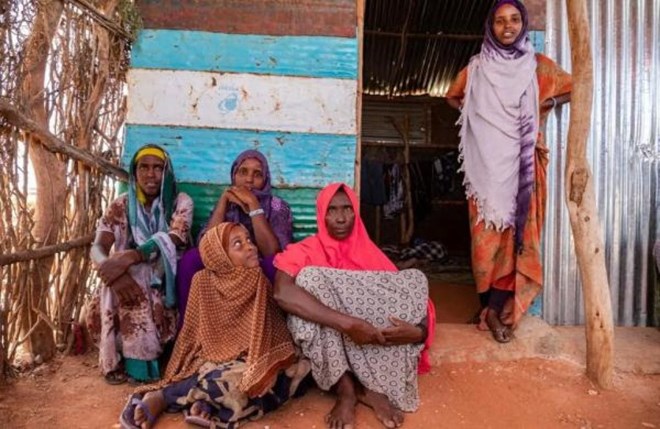
Tuesday June 13, 2023

Kadija Abdi Diriri (in the middle) is among the approximately 100,000 persons who in February fled from clashes in Laascaanood, in the Somaliland area, seeking safety in the Somali region in Ethiopia | Photo: Diana Diaz / UNHCR
Ethiopia is facing various emergencies and is critically under-financed: UNHCR denounced this situation in a press release on June 8.
Two months after the launch of the interagency refugee response appeal to provide support for Somali refugees fleeing to Ethiopia since February, only 2% of the dedicated funds have been received.
The appeal was for $116 million (about €107 million), said the United Nations High Commissioner for Refugees (UNHCR) in a press release on June 8. The lack of new funds is seriously impairing the response on the ground, the UN agency stated.
In the meantime UNHCR and its partners have reviewed the priorities, using the existing funds from other emergencies to begin to respond to the situation given the daily growing number of persons arriving in the country in the Horn of Africa.
Somaliland shelters 100 thousand displaced personsIt is estimated that approximately 100,000 persons fled from the ongoing conflict and from violence in Laascaanood, a city in the region of Somaliland, in Somalia. Families, women, children, the elderly, and persons with disabilities all fled following bombings and explosions that destroyed their homes, forcing them to seek shelter and safety in the area of Dollo in Ethiopia.
Since the beginning of the emergency, UNHCR and its partners who support the Ethiopian government, have acted rapidly to provide life-saving assistance. Medicines, water, and other basic necessities were delivered to local clinics in the area for the hosting communities and for the refugees.
Despite the lack of local resources, the hosting communities in the entire area opened their doors to nearly 89% of the displaced persons. While some can live with Ethiopian families, others find shelter under trees, which exposes them to possible animal attacks, theft, and gender violence.
Many are in need of shelter, food, and medical assistance.
Over 20,000 Somali refugees were transferred by the Ethiopian government and UNHCR, with the support of its partners, to a new site in Mirqaan, where water distribution, emergency shelter, and sanitary services are offered.
The Ethiopian Government's Refugees and Returnees Service (RRS) is carrying out individual biometric registrations with the support of UNHCR.
But, due to the limited resources, which are already visible, the UNHCR fears that without urgent support, both for the refugees and for the hosting communities, the consequences will be disastrous.
In Mirqaaan water provision is severely limited due to the cost of fuel for transport and it is estimated, the current resources will only last four months.
At this time refugees receive only 10 liters of water per person per day, which is under the standard of 15 liters. Only 30% of lodging is available, with some families placed in cramped facilities or forced to sleep outside in local communities.
Limits to aid
Even the support for refugees sheltered in the local communities has reduced. In Docmo, Hegalle, Mirqaan, and Goob, where Ethiopians faced severe shortages themselves due to drought and lack of essential services, the UNHCR and its partners could not provide adequate assistance to the medical centers to assure the much-needed interventions.
Food distribution will be limited to some areas due to the lack of fuel and many children will be unable to go to school due to the small size of classrooms available.
The UNHCR is worried about the effect the lack of funds for the generous hosting communities, who have welcomed and sheltered the refugees sharing their resources, will have.The increasing scarcity of primary goods and services could have catastrophic consequences for peaceful coexistence and stability in the region.
The recent influx has meant that Ethiopia is now hosting nearly one million refugees, but its generosity is not matched by the insufficient funding it has received.